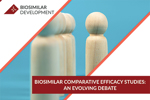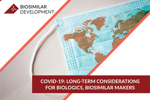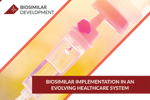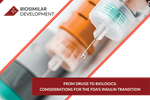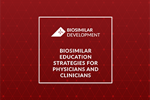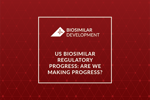BIOSIMILAR DEVELOPMENT CONTENT COLLECTIONS
Exclusively for subscribers of Biosimilar Development, our content collections bundle articles centered around a particular topic or theme. These carefully curated selections feature content from both our internal team of editors as well as our subject matter experts who contribute regularly to the site.
-
Biosimilar Comparative Efficacy Studies: An Evolving Debate Promotion
The debate over whether the biosimilar regulatory paradigm can shift away from comparative efficacy trials has intensified over the past few years. This collection of articles serves as a snapshot of the many different components of this ongoing discussion. In addition to articles arguing why it is time to move forward, it's also important to acknowledge what has been learned from these clinical trials, what challenges they will pose in the near future, and in which situations clinical trials may serve as a valuable differentiator in the competitive future market place.
-
COVID-19: Long-Term Considerations For Biologics, Biosimilar Makers
The COVID-19 pandemic has thrown the entire pharmaceutical industry, as well as patients, providers, and sites of care for a loop. Though small molecule novel treatments and generics have seen much more pronounced impacts from market shut-downs and supply-chain disruptions, the biologics and biosimilars industry has also been striving to understand how the pandemic will alter availability and usage of biologic products. This collection of articles surveys a wide array of considerations facing biopharma and biosimilar companies, including the pandemic's impact on regulatory interactions, product supply and demand, materials sourcing, and market access and uptake.
-
Biosimilar Implementation In An Evolving Healthcare System
As more biosimilars enter the U.S. market, especially for the potentially curative oncology blockbusters, the competitive landscape is finally intensifying. In the wake of multiple biosimilar competitors for the same reference product, it’s important we understand the systems in which these products are being introduced. How are Integrated Delivery Networks, independent physician offices, medical centers, and hospitals preparing for and greeting biosimilars? Which best practices have healthcare practitioners put in place to ensure efficient usage, and where do hang-ups still exist? In this e-book, experts from a wide range of settings of care explain their successful biosimilar implementation initiatives, the evolving healthcare treatment landscape, and which systemic barriers still must be overcome to improve education and uptake.
-
From Drugs To Biologics: Considerations For The FDA's Insulin Transition
In line with a Congressional directive, the FDA must transition products previously approved as drugs under the Federal Food, Drug, and Cosmetic Act (FD&C Act) to biologics under the Public Health Service Act (PHS Act) by March 23, 2020. Though this directive applies to 90 soon-to-be biologic products, including growth hormones, the insulin products have been garnering the most attention. Following this transition, biosimilar makers investing in follow-on biologics to current branded products will have their products approved via the 351(k) biosimilars pathway. Novel products will be transferred to the 351(a) biologics pathway. This collection of articles examines the upcoming regulatory transition in depth, sharing industry and patient perspectives on the changing regulatory requirements and market access strategies and concerns for this critical class of medicines.
-
Biosimilar Education Strategies for Physicians And Clinicians
Free collection of articles highlighting some of the dynamics playing out in the hospital setting for biosimilars, as well as how physicians and drugmakers can foster a greater understanding of biosimilar medicines.
-
U.S. Biosimilar Regulatory Progress: Are We Making Progress?
In line with a Congressional directive, the FDA must transition products previously approved as drugs under the Federal Food, Drug, and Cosmetic Act (FD&C Act) to biologics under the Public Health Service Act (PHS Act) by March 23, 2020. This collection of articles examines the upcoming regulatory transition in depth, sharing industry and patient perspectives on the changing regulatory requirements and market access strategies and concerns for this critical class of medicines.

